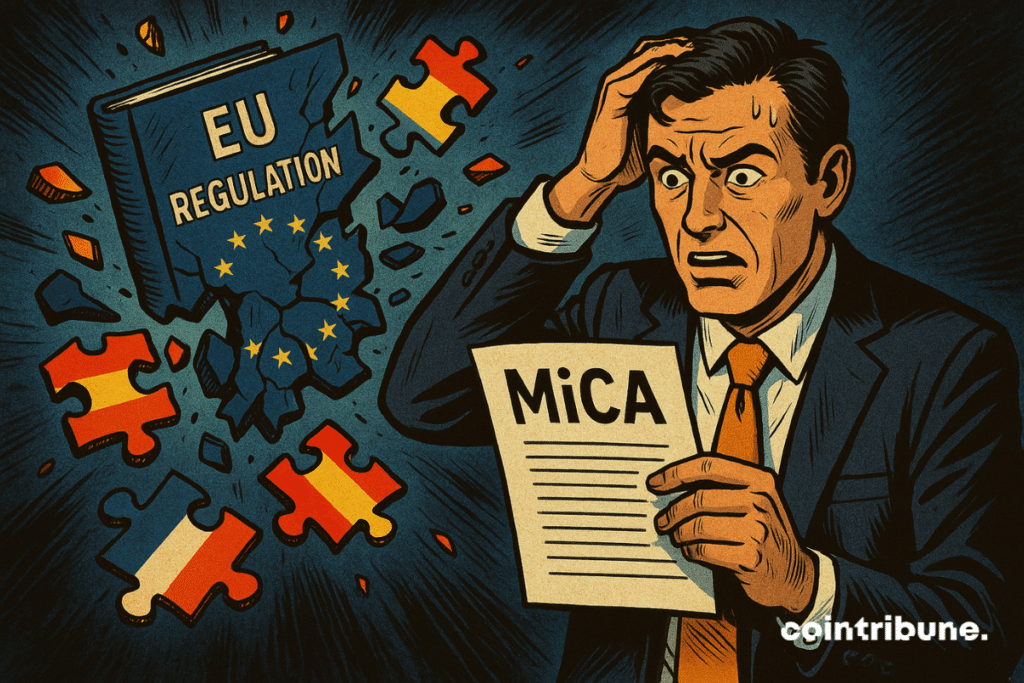MiCA: Bitpanda Denounces A Two-tier Crypto Regulation
Bitpanda’s Head of Public Affairs warns about persistent disparities in the implementation of MiCA regulation across Europe. Despite its promises of harmonization, the European Union struggles to establish a true single market for cryptocurrencies. MiCA is underway, certainly, but each member state interprets and applies the law in its own way.

In brief
- The Bitpanda platform holds three MiCA licenses, a record in Europe.
- The implementation of MiCA remains fragmented across EU member states.
- Some national regulators apply the law strictly, others much less so.
- Bitpanda calls to bridge these gaps to ensure fair competition.
Bitpanda Criticizes the Incomplete Harmonization of MiCA
Benedikt Faupel, Head of Public Affairs at Bitpanda, shared his concerns during the German Blockchain Week.
The Austrian exchange, founded in 2014, now holds three MiCA licenses, a record in the industry. This privileged position gives it a unique vantage point on the implementation of the European regulatory framework.
“With MiCA, everything is much simpler“, admits Faupel.
The regulation effectively ended the previous chaos, where no fewer than 17 distinct licensing regimes coexisted in Europe. This fragmentation forced crypto actors to navigate a complex regulatory maze to operate at the European level.
Yet, the promised harmonization remains largely theoretical. National regulators interpret MiCA through their own lenses, creating de facto different standards from one country to another.
This “à la carte” approach jeopardizes the fundamental goal of a single European market for cryptocurrencies.
The most striking example concerns licensing processes. Some regulators require comprehensive institutional reviews before granting their authorizations.
Others favor a more pragmatic approach, deepening their analyses only when necessary.
This creates a kind of imbalance.
The Challenges of European Harmonization
This fragmentation hardly surprises observers familiar with the sector.
It’s predictable. It is not inherent to MiCA, but simply the result of trying to regulate a sector as young as crypto.
Benedikt Faupel
By definition, a market as disruptive as that of digital assets resists efforts for regulatory uniformity.
But the consequences of this heterogeneity go far beyond a simple administrative headache. They introduce a distortion of competition between European players: some operate in a favorable environment, while others face heavier or slower regulation.
For crypto companies, this means adapting their expansion strategies according to national constraints — a hindrance to smooth development at the continental scale.
Faupel therefore calls for deeper harmonization among regulators.
The sector had to expect this. The regulatory gap between MiCA member countries must be bridged to guarantee fair competitive conditions across the European Union.
However, he acknowledges that this convergence can only be achieved through gradual adjustments to the regulatory framework.
In this spirit, Bitpanda advocates for true consistency in rule implementation. The goal is clear: to enable compliant companies to operate unimpeded across the entire European market.
And this is not just a theoretical issue. Institutional adoption is accelerating, as evidenced by the partnership between Bitpanda and Deutsche Bank, which plans to offer crypto custody to its clients as early as next year.
MiCA represents a major advance for the regulation of digital assets in Europe. But without real harmonization of its application, its promises risk eroding. Bitpanda calls for course correction before the EU loses its advantage in the global race to set crypto regulation standards.
Maximize your Cointribune experience with our "Read to Earn" program! For every article you read, earn points and access exclusive rewards. Sign up now and start earning benefits.
Passionné par le Bitcoin, j'aime explorer les méandres de la blockchain et des cryptos et je partage mes découvertes avec la communauté. Mon rêve est de vivre dans un monde où la vie privée et la liberté financière sont garanties pour tous, et je crois fermement que Bitcoin est l'outil qui peut rendre cela possible.
The views, thoughts, and opinions expressed in this article belong solely to the author, and should not be taken as investment advice. Do your own research before taking any investment decisions.